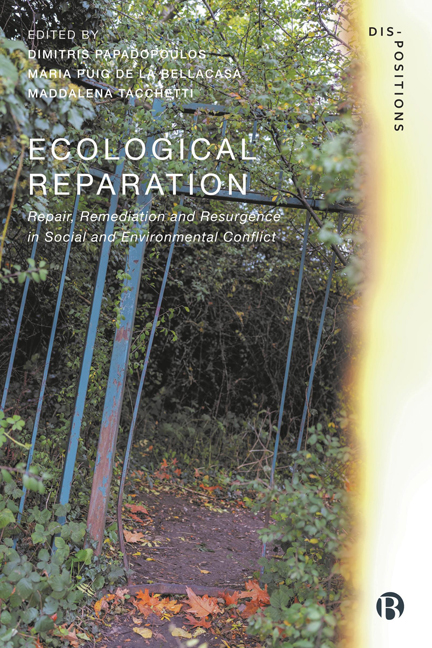Book contents
- Frontmatter
- Contents
- List of Figures
- Notes on Contributors
- Acknowledgements
- Note on the Figures
- Dis-Positions Series Preface
- Introduction: No Justice, No Ecological Peace: The Groundings of Ecological Reparation
- PART I Depletion<>Resurgence
- PART II Deskilling<>Experimenting
- PART III Contaminating<>Cohabiting
- PART IV Enclosing<>Reclaiming Land
- PART V Loss<>Recollecting
- PART VI Representing<>Self-governing
- PART VII Isolating<>Embodying
- PART VIII Growth<>Flourishing
- Index
19 - Ri-Maflow: Des-pair, Resistance and Re-pair in an Urban Industrial Ecology
Published online by Cambridge University Press: 28 March 2024
- Frontmatter
- Contents
- List of Figures
- Notes on Contributors
- Acknowledgements
- Note on the Figures
- Dis-Positions Series Preface
- Introduction: No Justice, No Ecological Peace: The Groundings of Ecological Reparation
- PART I Depletion<>Resurgence
- PART II Deskilling<>Experimenting
- PART III Contaminating<>Cohabiting
- PART IV Enclosing<>Reclaiming Land
- PART V Loss<>Recollecting
- PART VI Representing<>Self-governing
- PART VII Isolating<>Embodying
- PART VIII Growth<>Flourishing
- Index
Summary
12 April 2019. I take the train early in the morning and I arrive in Trezzano sul Naviglio. Right out of the railway station, I find myself immediately in an industrial scenario: warehouses, factories, forklifts, trucks, graffiti. And workers. All warehouses look pretty much the same with their signs reporting the latest name of the company, maybe the name of the latest owner and a vague reference to their trade. I walk through the monotony and the squalor of this half a mile of tired capitalism. The time of thriving entrepreneurs is gone: some businesses struggle to survive, some are tempted by the allure of relocalizing production where labour costs are lower, others have already abandoned their warehouses. Ri-Maflow finally wakes me up from this nightmarish torpor. It looks like just one more warehouse. Its graffiti looks like just the graffiti I have seen on the walls of the previous warehouses. And yet they are different, they speak to me: ‘Ri come Ri-Maflow, Ri-uso, Ri-ciclo, Ri-appropriazione, Ri-volta il debito, Rivoluzione!’ (Re as Ri-Maflow, Re-use, Re-cycle, Re-appropriation, Re-verse the debt, Revolution!).
I am here to attend the third Euro-Mediterranean meeting of workers’ economy. At the registration desk they immediately find me something I can contribute to: ‘You speak English, right? Come here! How do you say “Dai rifiuti all’arte?” ‘ (From waste to art). ‘Because we have lots of international guests today. If they look at this stuff, they don’t understand it was garbage!’ Pippo, Mara and Mauro call it modernariato, modern antiques: repair and recycling old abandoned objects into authentic pieces of design. ‘In Milan, hipsters would pay 300€ for this. Can you believe it?’ A few hours and many glasses of wine later, I will walk two miles to the nearest ATM to get cash and buy one of these fabulous lamps (can you believe it?). I meet Abraham: he is probably the youngest worker here at Ri-Maflow, he’s from Gambia, he speaks English and he’s happy to show me around. I learn from him that I mispronounce the name of the factory: it is not Rima-flow as I thought fantasizing about a romantic association between the factory and poetry (rima means rhyme in Italian).
- Type
- Chapter
- Information
- Ecological ReparationRepair, Remediation and Resurgence in Social and Environmental Conflict, pp. 289 - 300Publisher: Bristol University PressPrint publication year: 2023



